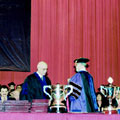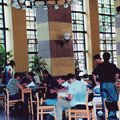|
|
 |
 |
 |
 |
 |
|
 |
 |
 |
 |
 |
|
 |
|
 |
|
 |
|
|
|
 |
|
|
|
 |
|
|
|
Journalism and Mass Communication Courses (JRMC) |
|
Department of Journalism and Mass Communication
School of Business, Economics and Communication
Distinguished Lecturer: S. A. Schleifer
Professor: H. Amin (Chair)
Senior Lecturer: S. Friedlander
Associate Professor: K. Keenan
Assistant Professors: R. Abdullah, R. Berenger
Lecturers: H. Fikry, N. Hamdy, J. Key
Master of Arts
The master of arts program in journalism and mass communication is designed to provide intellectual growth and advanced training for persons already engaged in mass media or public information work. Students wishing to specialize in a particular area, such as marketing communications or international business journalism, sociological or political communication, are encouraged to design a sequence of elective courses that best meets their interests.
Admission
In addition to the general requirements established by the university, the applicant must demonstrate a proficiency in English at an advanced level. Applicants are admitted in the fall semester.
Students who have neither an undergraduate degree in journalism nor at least two years of significant mass media or research experience might be asked to overcome deficiencies through prescribed readings and/or a program of undergraduate courses completed with grades of B or higher.
Students entering this program may be required to take a diagnostic test to determine whether they need to take undergraduate prerequisites in order to eliminate academic deficiencies.
Courses
A minimum of 27 graduate credit hours is required, including the following four core courses: JRMC 500 Mass Communication Theory and Literature, JRMC 502 Current Issues in Mass Communication, JRMC 504 Research Methods in Mass Communication, and JRMC 550 Seminar in International Communication.
Students should complete JRMC 500 and 504 as early after admission to the program as possible. Because of the interdisciplinary scope of mass communication, students may, with adviser approval, take and apply up to three 500-level courses (9 hours) from other disciplines. A maximum of six credit hours of 400-level coursework may be approved and counted toward the required credit hours.
Comprehensive Examination
Master of Arts students must complete JRMC 500, 502, 504 and 550 in preparation for the comprehensive examination. The examination procedure is described in the "General Requirements" section. An oral examination may be required in addition to the written examination. Students must pass comprehensive examinations before being permitted to begin work on their theses.
Thesis
A thesis is required for all students. The department's thesis committee must approve the thesis topic after the student, in consultation with an advisor, submits a formal proposal. Written in English, the thesis must be defended by the student before faculty members, and must conform to current university requirements, policies and procedures. |
|
Master of Arts Courses
|
JRMC |
500 |
Mass Communication Theory and Literature, 3 cr. |
| |
501 |
Advanced Reporting and Writing, 3 cr. |
| |
502 |
Current Issues in Mass Communication, 3 cr. |
| |
504 |
Research Methods in Mass Communication, 3 cr. |
| |
506 |
Internship, 3 cr. |
| |
550 |
Seminar in International Communication, 3 cr. |
| |
570 |
Seminar in Mass Communication and National Development, 3 cr. |
| |
580 |
Impact of Television: Issues and Developments, 3 cr. |
| |
590 |
Special Topics, 3 cr. |
|
|
|
Graduate Diploma in Television Journalism
The diploma is intended to provide basic knowledge of the history and practice of television journalism. Students completing the program will have a working familiarization with all of the skills required of a video journalist-reporting, videotaping, writing and narrating a field report as well as proficiency in digital video editing and studio management. This program is intended for students who have not already specialized in broadcast journalism at AUC at the undergraduate level.
Admission
Requirements for the JMC Master of Arts program are applicable to applicants seeking a graduate diploma in television journalism. Applicants who have not taken JRMC 201, or its equivalent at other institutions must take JRMC 201 as a prerequisite prior to taking courses in the graduate diploma unless applicant has demonstrated professional news writing experience as determined by the Graduate Committee.
TV Graduate Diploma Courses
A minimum of six courses totalling 18 credit hours is required for the diploma.
All students must take the following:
|
|
|
JRMC |
506 |
Internship, 3 cr. |
| |
537 |
Electronic Newsgathering, 3cr. |
| |
538 |
Broadcast News Voice, Speech and Presentation Workshop, 3 cr. |
| |
539 |
TV News Studio Workshop, 3 cr. |
| |
541 |
Camera and Editing Workshop, 3 cr. |
|
ALNG |
421 |
Professional and Technical Writing (for Arabic Broadcasting), students can substitute any non-required JRMC graduate course for this requirement, 3cr. |
|
|
|
Journalism & Mass Communication Courses (JRMC)
|
|
| | CourseNum |
CourseTitle |
 |
500 |
Mass Communication Theory and Literature |
 |
501 |
Advanced Reporting and Writing |
 |
502 |
Journalism & Mass Communication
 |
|
|
 |
 |
|
|
 |
|
|
 |
 |
 |
 |
 |
|
 |
 |
 |
 |
 |
|
 |
|
 |
|
 |
|
|
|
 |
|
|
|
 |
|
|
|
Journalism and Mass Communication Courses (JRMC) |
|
Department of Journalism and Mass Communication
School of Business, Economics and Communication
Distinguished Lecturer: S. A. Schleifer
Professor: H. Amin (Chair)
Senior Lecturer: S. Friedlander
Associate Professor: K. Keenan
Assistant Professors: R. Abdullah, R. Berenger
Lecturers: H. Fikry, N. Hamdy, J. Key
Master of Arts
The master of arts program in journalism and mass communication is designed to provide intellectual growth and advanced training for persons already engaged in mass media or public information work. Students wishing to specialize in a particular area, such as marketing communications or international business journalism, sociological or political communication, are encouraged to design a sequence of elective courses that best meets their interests.
Admission
In addition to the general requirements established by the university, the applicant must demonstrate a proficiency in English at an advanced level. Applicants are admitted in the fall semester.
Students who have neither an undergraduate degree in journalism nor at least two years of significant mass media or research experience might be asked to overcome deficiencies through prescribed readings and/or a program of undergraduate courses completed with grades of B or higher.
Students entering this program may be required to take a diagnostic test to determine whether they need to take undergraduate prerequisites in order to eliminate academic deficiencies.
Courses
A minimum of 27 graduate credit hours is required, including the following four core courses: JRMC 500 Mass Communication Theory and Literature, JRMC 502 Current Issues in Mass Communication, JRMC 504 Research Methods in Mass Communication, and JRMC 550 Seminar in International Communication.
Students should complete JRMC 500 and 504 as early after admission to the program as possible. Because of the interdisciplinary scope of mass communication, students may, with adviser approval, take and apply up to three 500-level courses (9 hours) from other disciplines. A maximum of six credit hours of 400-level coursework may be approved and counted toward the required credit hours.
Comprehensive Examination
Master of Arts students must complete JRMC 500, 502, 504 and 550 in preparation for the comprehensive examination. The examination procedure is described in the "General Requirements" section. An oral examination may be required in addition to the written examination. Students must pass comprehensive examinations before being permitted to begin work on their theses.
Thesis
A thesis is required for all students. The department's thesis committee must approve the thesis topic after the student, in consultation with an advisor, submits a formal proposal. Written in English, the thesis must be defended by the student before faculty members, and must conform to current university requirements, policies and procedures. |
|
Master of Arts Courses
|
JRMC |
500 |
Mass Communication Theory and Literature, 3 cr. |
| |
501 |
Advanced Reporting and Writing, 3 cr. |
| |
502 |
Current Issues in Mass Communication, 3 cr. |
| |
504 |
Research Methods in Mass Communication, 3 cr. |
| |
506 |
Internship, 3 cr. |
| |
550 |
Seminar in International Communication, 3 cr. |
| |
570 |
Seminar in Mass Communication and National Development, 3 cr. |
| |
580 |
Impact of Television: Issues and Developments, 3 cr. |
| |
590 |
Special Topics, 3 cr. |
|
|
|
Graduate Diploma in Television Journalism
The diploma is intended to provide basic knowledge of the history and practice of television journalism. Students completing the program will have a working familiarization with all of the skills required of a video journalist-reporting, videotaping, writing and narrating a field report as well as proficiency in digital video editing and studio management. This program is intended for students who have not already specialized in broadcast journalism at AUC at the undergraduate level.
Admission
Requirements for the JMC Master of Arts program are applicable to applicants seeking a graduate diploma in television journalism. Applicants who have not taken JRMC 201, or its equivalent at other institutions must take JRMC 201 as a prerequisite prior to taking courses in the graduate diploma unless applicant has demonstrated professional news writing experience as determined by the Graduate Committee.
TV Graduate Diploma Courses
A minimum of six courses totalling 18 credit hours is required for the diploma.
All students must take the following:
|
|
|
JRMC |
506 |
Internship, 3 cr. |
| |
537 |
Electronic Newsgathering, 3cr. |
| |
538 |
Broadcast News Voice, Speech and Presentation Workshop, 3 cr. |
| |
539 |
TV News Studio Workshop, 3 cr. |
| |
541 |
Camera and Editing Workshop, 3 cr. |
|
ALNG |
421 |
Professional and Technical Writing (for Arabic Broadcasting), students can substitute any non-required JRMC graduate course for this requirement, 3cr. |
|
|
|
Journalism & Mass Communication Courses (JRMC)
|
|
|
|
|
|
 |
 |
|
Copyright © 2004-2005, The American University in Cairo |
|
|
| |
| | |
